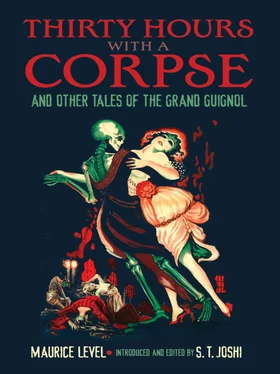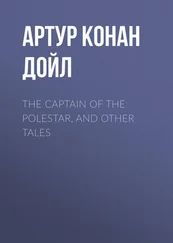Their welcome touched her, but the thick, rank smoke made her cough, and she could hardly breathe as she replied:
“No… I’ve no time now… Is Madame in?”
“Yes, there she is.”
She smiled timidly at the manageress.
“I wanted to ask you, Madame, if I could get at my things. The clothes I have on aren’t warm enough…”
“Any clothes you left were taken up to the attic; they’ll be there somewhere. I’ll send someone to look for them… Sit down by the stove and warm yourself.”
“No… I’ve no time now. I’ll come back presently.”
She went to the door. One of the men jeered:
“At the old business already? You aren’t wasting much time.”
She went out, and the short stay in the stifling room made the cold outside seem more piercing than ever. People were hurrying along laden with bead-wreaths and bouquets of flowers; others, dressed in their best clothes, talked and laughed, and one saw at a glance that they were carrying their offerings to the cemetery as a matter of habit, that time had taken the edge from their grief.
All along the side of the pavement barrows of flowers were drawn up. Chrysanthemums with curled petals drooped over clusters of roses; here and there mimosa shed its golden powder over bunches of violets. Nearer to the cemetery, in front of the shops of the marble masons, pots of flowers were arranged on the shelves of stands, insignificant, with neat foliage and restrained colors; further on were immortelles and large bead-wreaths…
She looked at all this with eyes that glowed with envy. If only she could get some for him, just a little bunch… for him where he was lying at the far end of the cemetery in his poor, unconsecrated grave, a bare mound, without a single word to show that he was lying there.
“Murderer”… that meant nothing to her. He was the being she adored, her Man, the lover who had possessed not only her body but her whole soul… In a moment of madness he had killed someone… Had he not paid his horrible debt in full?
The day he had been arrested she had sworn never to have anything to do with any other man, never; to give up the life she had been leading, to work, to become an honest girl once more… to live in memories of him…
She kept on looking at the flowers. A seller held out a bunch of roses: “A bouquet? Some chrysanthemums then? Violets?”
She passed without replying, for she did not poosess one farthing. Yet there was but one idea in her mind—flowers. She must have some flowers… she must get some flowers for him somehow… she had sworn she would.
She was nearly fainting with hunger and fatigue, but she was no longer aware of it. She was thinking only of the bare strip of earth in the cemetery, imagining it with some flowers brightening it up. But the money… how was she to get it? What could she do?
The way that suggested itself was the obvious one, nor did it seem to clash with her vow to remain true to his memory.
Just as a good artisan returns to his factory, takes up his tools and starts on his work, she mechanically patted her hair into order, arranged her poor dress and began to walk the street as she used to in the old days when her man, sitting playing cards in the café, was the only thing in the world she cared about.
On she walked, her eye watchful, swaying her waist as she whispered between her teeth:
“Stop!… I want to speak to you…”
But she was too emaciated: one glance at her and the men hurried away. And indeed her face was no longer a face for pleasure; nor was her body, its sharp angles and deep hollows showing clearly under her thin cotton dress.
In bygone days when she was pretty, when she really was the “Blue Eyes” everyone admired, it was different. Now she was only an object of pity.
The daylight was fading. Suppose the cemetery was shut before she was able to buy the flowers…
A thin, misty rain was falling, silent, impalpable, and everything was becoming wrapped in gray shadows. You could see nothing of her thin face now except her eyes, two great eyes burning with fever.
A man was passing the corner of a quiet street, his coat-collar up, his hands in his pockets. She brushed up against him and said softly, her whole heart’s craving vibrating in her voice:
“Stop!… Won’t you come with me?…”
He looked at her for a moment. She had gone close up to him, her eyes penetrating his with the inspired expression of one conscious of a high mission.
He took her arm, and she guided him to the low hotel she had recently left. Through the half open door she said quickly:
“My key… A candle…”
The manageress replied in a low voice: “No. 23, second floor, third door.”
The men and the girls in the café bent forward to see who was there, and as she went upstairs she heard exclamations and bursts of laughter.
…It was almost dark when she came down again. She threw a hasty goodbye at her companion and set off at a run. Stopping before the first flower-seller she came to, she seized the nearest bunch and threw down the two pieces of silver that clinked in her hands.
Quickly, quickly, she ran to the cemetery. People were coming away in little groups. She trembled. Would there still be time?
At the entrance the gate-keeper said: “Too late! We’re closing now.”
“Oh! please, please. I only want to run in and out again. Just two minutes…”
“Very well. But—quick.”
Down the path she rushed, stumbling over the stones in the dark. It was a long way. She could hardly breathe, something was burning so painfully in her chest. She stopped by the wall where those who are executed are buried, and fell on her knees, scattering her flowers on the earth. Her tears streamed from her eyes, dripping between the hands she pressed against her face. She tried to pray, but she could not remember any of the proper words, and she just sobbed, her lips on the ground:
“Oh! my man… my man…”
Then, so worn out she had lost all sensation in her limbs, but with a feeling of ease, almost of joy in her heart, she rose and hurried away. She even smiled at the gatekeeper as she said:
“You see I haven’t been long.”
But now that it was over, now she had kept her promise, had been near her man, she became aware again of the cold and her exhaustion. She could hardly drag herself along, her cough was so bad: every now and then she had to stop and lean against the wall…
At last she got back to the hotel and stumbled into the door. The girls and men were still playing cards in the overheated, smoke-filled room. A dead silence fell on them all when they saw her. She tried to laugh.
A woman at the far end of the room threw herself back on her chair and cried:
“You’ve made a fine start, Blue Eyes. Needed a bit of nerve, didn’t it?”
She shrugged her shoulders. The other went on:
“Did you know who it was?”
“No…”
“Well, I’ll tell you. It was Le Bingue.”
Blue Eyes stammered:
“What do you say? Le…”
Emptying her glass and taking up her cards again, the girl called back:
“Yes, Le Bingue… You know, the Executioner!”
WHEN HE had picked the lock, the man went in, shut the door carefully and stood listening intently. Although he knew the house was empty, the complete silence and inky darkness made an extraordinary impression on him. Never before had he experienced at one and the same time such a longing for and fear of solitude. He stretched out his hand, felt about the wall and fastened the bolt of the door. A little reassured, he took from his pocket a small electric lamp and looked round. The white patches of light that broke the darkness moved up and down with the beating of his heart. To give himself courage he murmured:
Читать дальше












